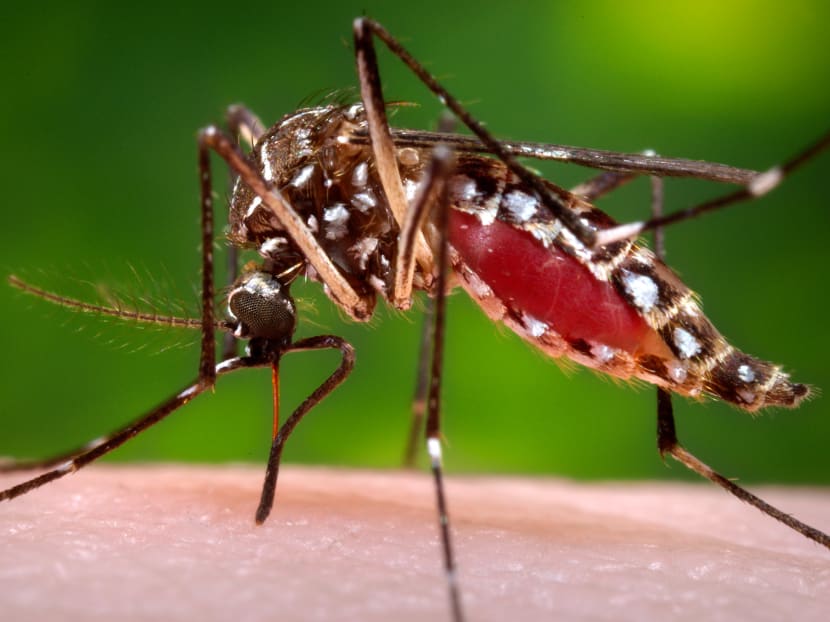S’pore records first Zika case
SINGAPORE — A 48-year-old man who travelled to Brazil has become the Republic’s first Zika patient, on the back of warnings from the authorities that a Zika infection case here was inevitable.

A female Aedes aegypti mosquito in the process of acquiring a blood meal from a human host. Photo: Centers for Disease Control and Prevention via AP
SINGAPORE — A 48-year-old man who travelled to Brazil has become the Republic’s first Zika patient, on the back of warnings from the authorities that a Zika infection case here was inevitable.
Announcing the case on Friday (May 13) in a joint statement, the Ministry of Health (MOH) and the National Environment Agency (NEA) also warned, that as the majority of people infected with the Aedes-borne virus do not show symptoms, “it is possible that some transmission may already have taken place before the first confirmed case of Zika was notified”.
Operations to contain possible transmission are being stepped up in the vicinity of the patient’s home in Watten Estate, which is not an active dengue cluster. Residents whose homes might be checked should “cooperate fully”, added the statement, which did not name the patient. The NEA may enter “inaccessible premises” by force after serving the requisite notices, to ensure any breeding habitats are destroyed quickly,
The patient, a Singapore permanent resident who travelled to Sao Paulo from March 27 to May 7, developed fever and a rash on Tuesday. Two days later, he was admitted to Mount Elizabeth Novena Hospital and isolated. He tested positive for Zika on Friday, and the MOH and NEA were notified.
The patient’s family members will be screened and advised to monitor their health, while residents in the vicinity will be alerted and told to seek medical attention if they become unwell and develop symptoms of fever and rash.
“The patient is currently well and recovering. He will only be discharged upon being tested negative for the Zika virus,” said the MOH and NEA. He will be transferred to the Communicable Diseases Centre at Tan Tock Seng Hospital for treatment and isolation, to minimise the chances of being bitten by mosquitoes and spreading the infection.
Like dengue, Zika causes a viral fever with skin rashes, body aches, and headache.
According to information on the Health Ministry’s website, the disease is “generally a mild and self-limiting illness (though) rare, serious neurological complications have been reported”.
The virus burst onto the international spotlight earlier this year due to its explosive growth in the Americas, particularly in Brazil where mothers infected with Zika have given birth to babies with abnormally small heads and underdeveloped brains.
Since January, the Government has been warning that a Zika case here was “inevitable”, and circulars were issued to doctors to heighten awareness of the virus.
The following month, the MOH and NEA took additional steps to prepare for possible cases after evidence linking Zika to microcephaly prompted the World Health Organization to declare a global health emergency.
These included expanding the testing of suspected cases to public hospital laboratories, and forming a Clinical Advisory Group to provide expert advice on the management of pregnant women who contract the virus.
Last month, Senior Minister of State (Health) Amy Khor reiterated that an infection here was unavoidable, given the volume of travel all year round. In the region, Vietnam, the Philippines, Thailand and East Malaysia have reported cases of the virus.
In its statement on Friday, the MOH and NEA urged those returning to Singapore from Zika-affected areas to monitor their health for two weeks and see a doctor if they develop symptoms such as fever, skin rashes, joint and muscle pains, headaches and red eyes.
They also urged the public to help minimise the potential spread of Zika by taking immediate steps to prevent mosquito breeding in homes, and applying insect repellent regularly.
Pregnant women are advised to put off non-essential travel to countries with active Zika outbreaks. Those who have travelled to affected areas should consult their doctors for testing of Zika, if they develop any symptoms.
Men returning from areas with ongoing Zika outbreaks should practise safe sex, or consider abstaining from sex for at least four weeks after their return to Singapore, the authorities added. The public can refer to the MOH’s webpage on Zika for more information: www.moh.gov.sg/zika









